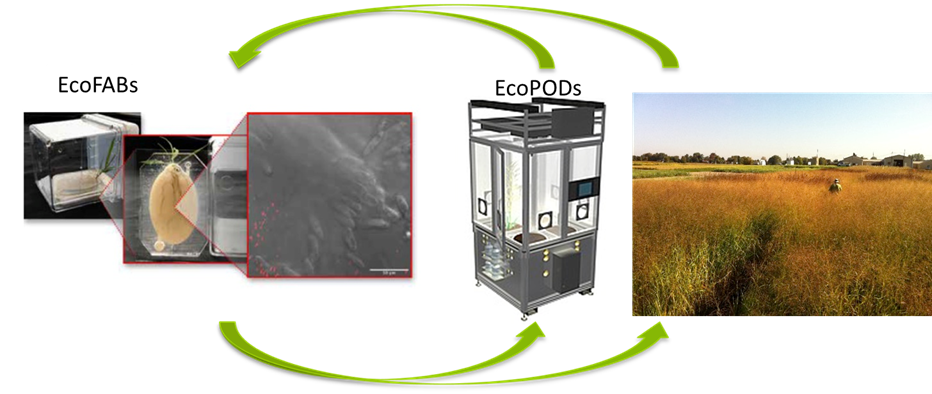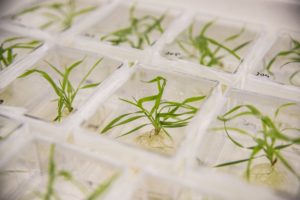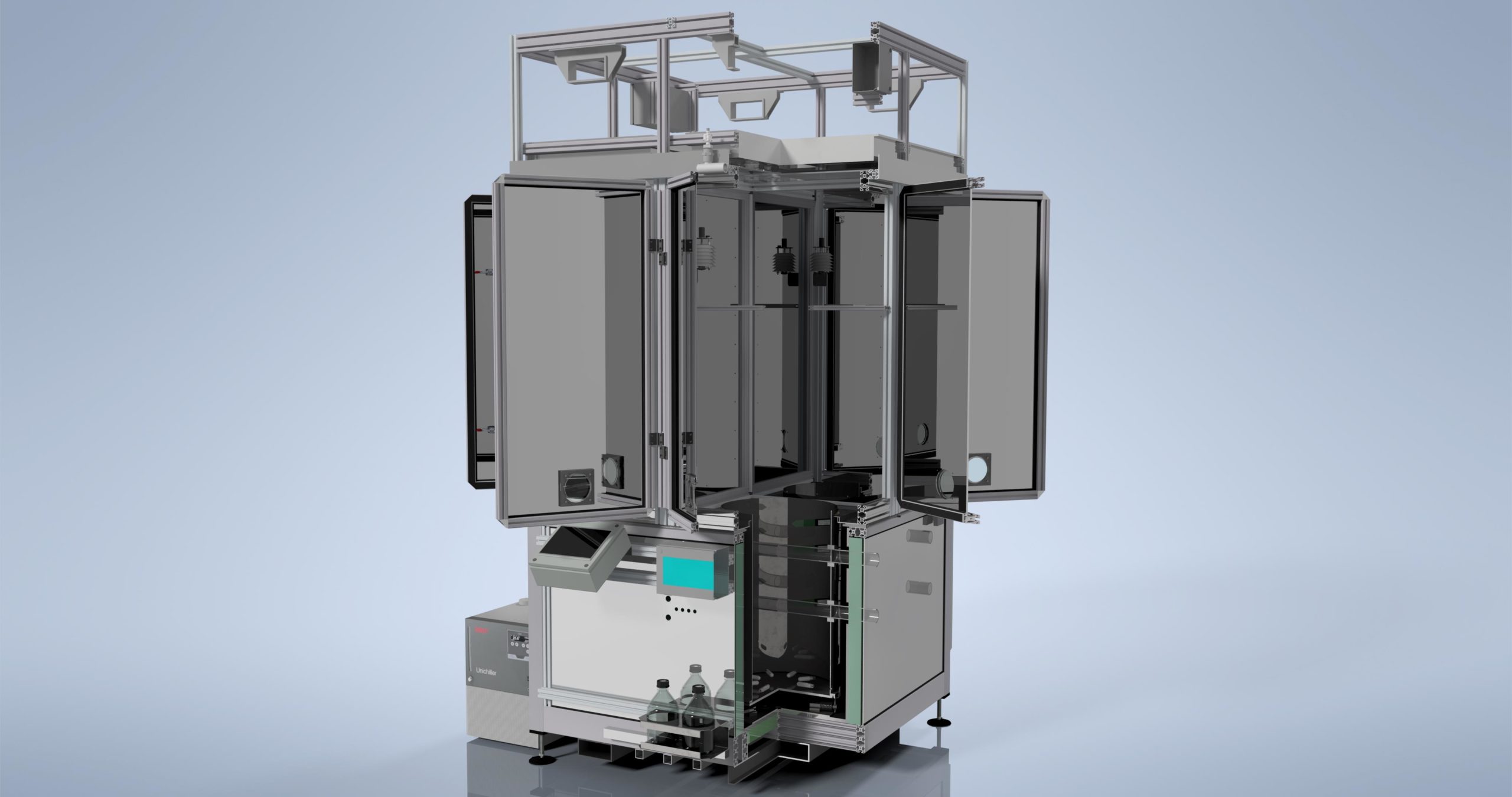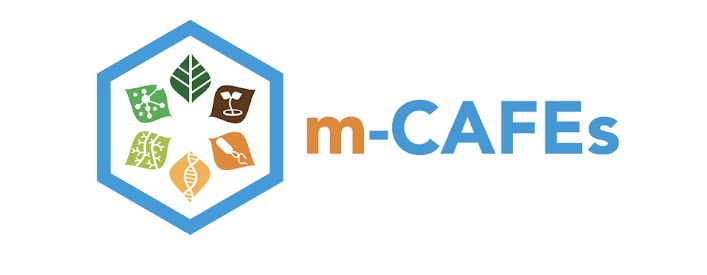About Fabricated Ecosystems Fabricated ecosystems hold promise for replicating important ecosystem dynamics while simultaneously streamlining studies by defining testable and important parameters using reproducible techniques. Berkeley Lab and collaborating institutions are using these systems to define principles for community assembly and structure; understand the functions of genes, microbes, and metabolomes; and predict microbiome health and trajectory. By advancing our understanding of microbiome structure and function, significant scientific and technical advances can be made in studies of biomedical technologies, environmental sciences, ecology, energy, and nutrient cycling. The following programs highlight current work related to fabricated ecosystems. |
Technologies |
|
EcoFAB is an initiative that aims at building model laboratory ecosystems across worldwide research laboratories to study environmental microbiomes for investigation of soil carbon cycling and low input sustainable crop production. Through this initiative, a lab-scale device or fabricated ecosystem has been developed to study soil-plant-microbe interactions in a reproducible and controllable system. |
|
EcoPODs are closed environments of several meters cubed that allow for direct and intensive monitoring of replicated plant-soil-microbe interactions across the complete plant life cycle. These indoor mesocosms were designed to bridge the gap between lab and field-scale experiments, providing the researcher with more control and manipulability than would be experienced in an open environment. EcoPODs are equipped with environmental controls to carefully regulate internal conditions including temperature, humidity, and other important climatic parameters. Additionally, these systems allow for the integration of various sensor types including those capable of monitoring soil moisture, oxygen, and key nutrient concentration. All output is stored and analyzed using computer models to accurately explain the environment within. The capability provided by an EcoPOD will assist in furthering our understanding of the complex, multifactorial dialogues that occur within ecosystems. |
Programs |
|
The m-CAFEs SFA (Microbial Community Analysis & Functional Evaluation in Soils Scientific Focus Area) is a multi-institutional project to develop mechanistic and spatio-temporal understandings of plant and microbial interactions within grass rhizosphere communities to predict community responses to environmental changes. Fabricated ecosystems are being created by combining controlled rhizosphere habitats (EcoFABs) are being used to perform detailed characterization of both constituent isolates and synthetic communities. EcoFABs are being created for this purpose through the bottom-up assembly of microbial communities within controlled rhizosphere habitats. These EcoFABs are then being used to characterize the function of individual isolates and synthetic communities within rhizosphere environments.These studies are being integrated with the development of predictive models that are iteratively refined through integrated simulations and experimentation. |
|
Trial Ecosystems for the Advancement of Microbiome Science (TEAMS) program was developed to create, validate, evaluate, and disseminate EcoFABs and related resources to be used by the larger microbiome science community (e.g. Environmental Molecular Sciences Laboratory (EMSL), Joint Genome Institute (JGI), Department of Energy Systems Biology Knowledgebase (KBase) users) to advance Biological and Environmental Research (BER) missions. Towards these goals, TEAMS is organizing ring-trial studies to evaluate the reproducibility of EcoFAB microbiome studies and to standardized analyses. To maximize reproducibility, TEAMS is creating an automated microbiome experimentation system (EcoBOT) capable of performing hundreds of EcoFAB experiments including assembly, cultivation, sampling, and imaging. |
|
ENIGMA (Ecosystems and Networks Integrated with Genes and Molecular Assemblies) SFA is a multi-disciplinary, multi-institutional research effort focused on studying ground water and sediment microbiomes at the contaminated Oak Ridge Field Research Site (FRC). ENIGMA’s goal is to develop the theory, technologies, and scientific approaches to gain a predictive, mechanistic understanding of the physical, chemical, and ecological constraints on the assembly and activity of microbial communities in dynamic environments. ENIGMA researchers are discovering and characterizing the reciprocal interactions between shallow subsurface microbial communities and the geochemical and geophysical parameters of the FRC to prove their approach. The hope is to obtain data with sufficient resolution to causally predict future changes in contaminant fate and microbial community dynamics from current observations. ENIGMA uses synthetic communities and custom bioreactors to create ecosystems that are used to develop generally applicable biochemical, biophysical, and computational technologies to rapidly understand the essential components of microbial systems across scales (molecules to cells to organisms to communities). Critically these fabricated ecosystems are helping discover, characterize, and dissect key microbial processes relevant to field observations to develop detailed hypotheses for field testing and ultimately deploy simulations in field conditions. |

FABRICATED ECOSYSTEMS: PUSHING THE BOUNDARIES OF EXPERIMENTAL SCIENCE
Learn More






